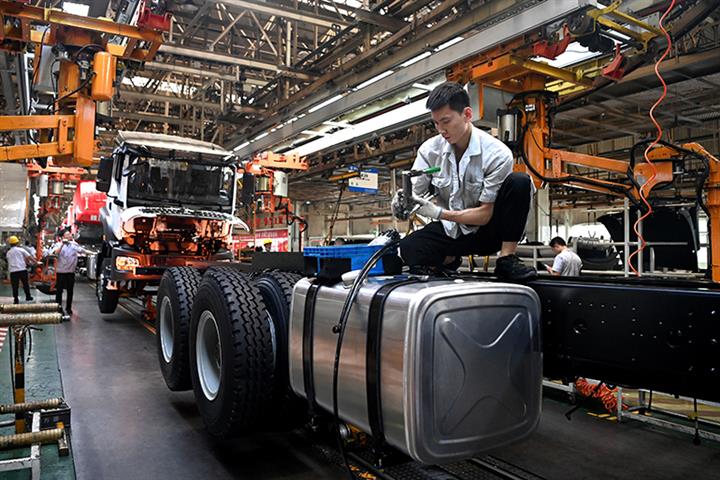 Foreign Banks Are Reassured by National Congress of China’s Emphasis on High-Quality Development
Foreign Banks Are Reassured by National Congress of China’s Emphasis on High-Quality Development(Yicai Global) Oct. 18 -- Several leading international investment banks have responded positively to the report released by the ongoing National Congress of the Communist Party of China, which lays out the blueprint for the country’s development and which states that high-quality development remains a priority for China.
High-quality development is the primary task of building a modern socialist country in an all-round way, with national security and social stability playing supporting roles, said Wang Tao, chief economist of Swiss lender UBS’ China division, referring to the report released by the 20th CPC National Congress yesterday. This is in line with a global trend as many governments have begun to emphasize national safety in recent years.
The long-term development strategy for the country has not changed, which will help stabilize market confidence and expectations, Wang said. The report continues to put an emphasis on market reforms and opening-up, as well as support for the private sector.
China’s economy should grow by 3 percent this year, the Zurich-based lender said. And it could rise to 5 percent next year, boosted by large amounts of infrastructure investment, strong manufacturing and an uptick in consumption. With inflation at a modest rate, China can continue to loosen policies.
The People’s Bank of China is likely to cut the reserve requirement ratio one or two more times this year, Wang said. Fiscal policies will continue to shoulder the heavy burden of ramping up spending, introducing tax breaks and encouraging infrastructure investment.
The long-term orientation of real estate policy is almost unchanged in this year’s report, Wang said. The government continues to accelerate the establishment of a housing system with multi-subject supply, multi-channel security and equal emphasis on rental and purchase.
Economic development is the first priority, Xing Ziqiang, chief economist at US financial services firm Morgan Stanley’s China arm, told Yicai Global. And the orientation is more balanced than the market expected. “In recent years, the Chinese government has shifted its policy focus from one of just growth to a balance between that of security and sustainability,” Xing said.
Both state-owned enterprises and private firms are vital to economic growth and the Party will continue to steadily support the private sector, Xing said, citing the report.
The reiteration in the report that high-quality development is the top priority for building a modern socialist country indicates that China still aims for reasonable growth, said Chang Jian, chief economist at UK lender Barclays’ China arm.
The report puts emphasis on developing new economic growth engines in the fields of information technology, artificial intelligence, biotechnology, new energy, new materials, high-end equipment and environmental protection. Technological self-reliance and a focus on economic resilience are key, London-based Barclays said.
Unchanging View
“Our first impression is that the report pays more attention to growth and security across multiple dimensions,” said Andrew Tilton, chief economist at US investment bank Goldman Sachs' Asia Pacific division.
Goldman Sachs expects China’s gross domestic product to expand 4.5 percent next year. The New York-based firm remains overweight on China’s capital markets and has a preference for mainland shares.
“We will not change our view,” Tilton said. “We prefer mainland shares, which are relatively less sensitive to international turbulence, and will continue to keep an eye on ‘common prosperity' and ‘little giant’ enterprises, which are early-stage firms with great potential, in terms of investment.”
The Chinese yuan should start to strengthen when the US dollar’s strong run begins to slow, Tilton said.
Green Agenda
The report attaches great importance to ‘eco-friendliness,’ saying that China should speed up its green transformation, implement energy-conservation strategies, develop low-carbon industries, advocate green consumption and promote the formation of eco-friendly and low-carbon production methods and lifestyles.
China will benefit from its global leadership in renewable energy and electric vehicle supply chains at a time when most of the world is striving to build a ‘greener planet,’ said Tang Qizhi, research strategist on China and head of research in Hong Kong at Swiss private lender Bank Julius Baer. China has rolled out very favorable policies in both sectors to achieve its zero carbon goals and boost the economy.
Editor: Kim Taylor